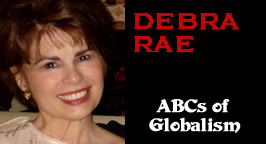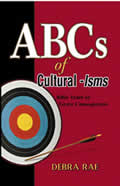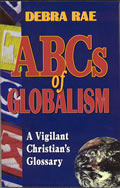ISLAMO-PHOBIC?
THINK AGAIN
PART 2
By
Debra Rae
September 4, 2011
NewsWithViews.com
Theological Lessons Learned from Girls of Riyadh and Kuwait
Not long ago, I read a fascinating book unlike any other. Translated into English from Arabic, the Girls of Riyadh compiles a series of emails written by a young Saudi Arabian woman who, at the time of the book’s release, was pursuing an endodontic degree in the States. Probably more entertaining than anthropomorphically relevant, our girls of Riyadh have much to teach us about Islamic culture and faith.[1]
Commonalities in matters of the heart provide a helpful springboard for cross-cultural dialogue, grounded in mutual empathy and respect. Accordingly, as Alsanea’s stories unfold, the reader is caught up in romantic fantasies of young Saudi women. Using today’s ever expanding “social network,” Alsanea shows Eastern kids to have much in common with their Western counterparts. And that’s a good thing.
Notwithstanding it’s a mistake for Westerners to interpret what they hear, and actions they observe, solely through the lens of Western culture. Doing so equates the Judeo-Christian worldview with Islam, but wrongly so.
State Religion v. Free Exercise Thereof
On many occasions, we’ve heard public claim that both Christianity and Islam are religions of peace. I agree. However, the “peace that passes understanding,” as intended in the Bible, is not the peace touted by Islamists. To the contrary, Islam speaks to the “peace” that comes by submitting to Allah—whether by conviction or, if need be, by force. The devout Muslim’s mission is to establish a global Islamic Caliphate.[2]
To a Muslim, there’s no clear distinction between government, society, culture, the judiciary, and religion. All huddle in singular submission to Allah and his prophet. In fact, many countries, as Saudi Arabia, endorse Islam as a State religion to be imposed on citizens. People of the Book—i.e., Christians and Jews—are allowed to live, but only as second-class citizens (under what’s called dhimmitude).[3]
In contrast, the First Amendment to the United States Constitution prevents government from imposing any religion, or even interfering with religious expression. Never intended to silence religionists in the public arena, as some suppose, the “separation” principle disallows State-sanctioned religion—e.g., an ummah (community of all who affirm Islam). Instead, American citizens enjoy the privilege of freedom to worship (or not) as they please.
It’s true. Not all Westerners embrace or even understand Christian theology. But whether they know it or not, like it or not, all Americans are influenced by it. Religious freedom, rule of law, free trade, and right to private property took form among early predominantly Christian settlements of the East Coast of North America—namely, at St. Augustine (1565), Plymouth (1620), Jamestown (1607), and Savannah (1733).
Furthermore, our nation’s Christian legacy finds expression in the first colonial grant made to Sir Walter Raleigh (1584); the first charter of Virginia, granted by King James I (1606); subsequent Virginia charters (1609 and 1611); and various ones granted to the other colonies.[4]
While author Christian J. Pinto’s exposé of Secret Mysteries of America’s Beginnings paints Thomas Paine, John Adams, Thomas Jefferson, and Benjamin Franklin in less than favorable light, God nonetheless used them to establish a nation with indisputably Christian underpinnings. Indeed, five-time Governor of Virginia Patrick Henry (1736-1799) insisted, "It cannot be emphasized too strongly, nor too often, that this great nation was founded, not by religionists, but by Christians; not on religions, but on the Gospel of Jesus Christ."[5]
Even so, America allows full, free exercise of all faiths and/or convictions—or none. While the population of the United States exceeds 300 million, only three percent are Muslim; all the same, in addition to Islamic day- and weekend- schools, there are some two thousand mosques scattered across our nation.[6]
In his 1791 autobiography, Benjamin Franklin "did not disapprove" of a Pennsylvania meeting place designed to accommodate preachers of all religions. "Even if the Mufti of Constantinople were to send a missionary to preach Mohammedanism to us,” Franklin mused, “he would find a pulpit at his service."[7]
A Westerner viewing the Arab Spring from a Judeo-Christian perspective may presume the fight is for American-style freedom and democracy, but it isn’t. Be clear. No Arabic word for “democracy” even exists, nor does the Arab Middle East tolerate any functioning democracy.
Significantly, no Arab country boasts even a single visible church of Muslim converts to Christianity. It’s simply not allowed.
Nature of Allah v. YHWH-Jesus
East-West perspectives regarding God himself are like oil and water. Whereas Allah (“the moon god”) judges arbitrarily, the God of the Bible is fully consistent in His judgments. In fact, He is the same yesterday, today, and forever. While Christianity sprang from the ultimate act of love (Christ’s substitutionary sacrifice), Allah never once is characterized as a god of love in Qur’anic verse. Of his ninety-nine attributes, love is not one of them.
In the Bible, Jesus is “the Truth,” and his words are true.[8] The tongue, we learn, is our “most unruly member.”[9] To follow in the Master’s footsteps, the tongue must be kept under guard and fully submitted to the Holy Spirit. While one of the Ten Commandments is not to bear false witness, a Muslim may lie with impunity, if need be. Gender distinctions are likewise telling. In Christ, there’s no “male nor female”; but in Islam, women are lesser creations.[10]
To read Western perspective into Eastern tradition skews reality—and dangerously so.
Sharia Law v Human Rights [11]
Author Rajaa Alsanea portrays girls of Riyadh as devoted to the faith in which they were raised. “Praise be to Allah” and “may the Prophet rest in peace” season their everyday speech; and many truly regret their misdeeds and plead for Allah’s mercy. While I don’t doubt the girls’ sincerity, I strongly oppose humanitarian abuses of fellow Islamists—to name two: honor killings and female mutilation.
Rajaa’s exposé of “uni-cultural, uni-ethnic, uni-religious” toxicity under patriarchal oppression underscores how the Islamic worldview differs from our own. For example, after hearing about Valentine’s Day through satellite television channels, Saudis took interest in celebrating it. Girls favored red accessories, and attentive boys took to the streets, handing out red roses to lovely passersby—until, that is, the religious police intervened. To the youngsters’ dismay, this “holiday of love” was outlawed. The Februarys that followed, even before schoolgirls entered campus gates, their clothes were subject to inspection for telltale splashes of renegade red!
| Subscribe to the NewsWithViews Daily News Alerts! |
Having lived as a young woman in Muslim society, I can relate. While touring Iran apart from the company of immediate male family members, I once was hauled in and subsequently intimidated by the “morality police”; and as a teacher at the American School of Kuwait, I too was subjected to rules and restrictions that were strictly applied to “all students and female teachers.” In such cases, male colleagues were exempt.
Were Western women forced by sharia law to wear head-to-toe coverings in public, or be dragged in and interrogated by the religious police, fewer Americans would herald politically-correct inclusionism for fear of somehow appearing—well, you know—intolerant.[12]
My challenge to the PC crowd is to wake up and smell the garlic and leeks before equating knowledge with hate and fear.
Islamo-phobic? Think again.
Click here for part -----> 1, 2, 3,
Footnotes:
1.
Rajaa Alsanea. Girls of Riyadh (London: Penguin Books, 2005).
2.
3.
Dr. William Wagner, How Islam Plans to Change the World (Grand Rapids,
MI: Kregel Publications, 2004): 80.
4.
Our Nation’s Heritage:
Noble or Compromised?, Part 1
5.
Secret
Mysteries of America's Beginnings - Eye of the Phoenix: Secrets
of the Dollar Bill.
6.
Omar Khalidi. "Mosque." Contemporary American Religion (New
York: Macmillan, 2000).
7.
The
Autobiography of Benjamin Franklin
8.
John 14:6; John 17:17
9.
James 3:1-12
10.
Galatians 3:28
11.
Welcome to ShariaMerica
12.
Today's
tactical pursuit of religious commonality.











 Share
This Article
Share
This Article






